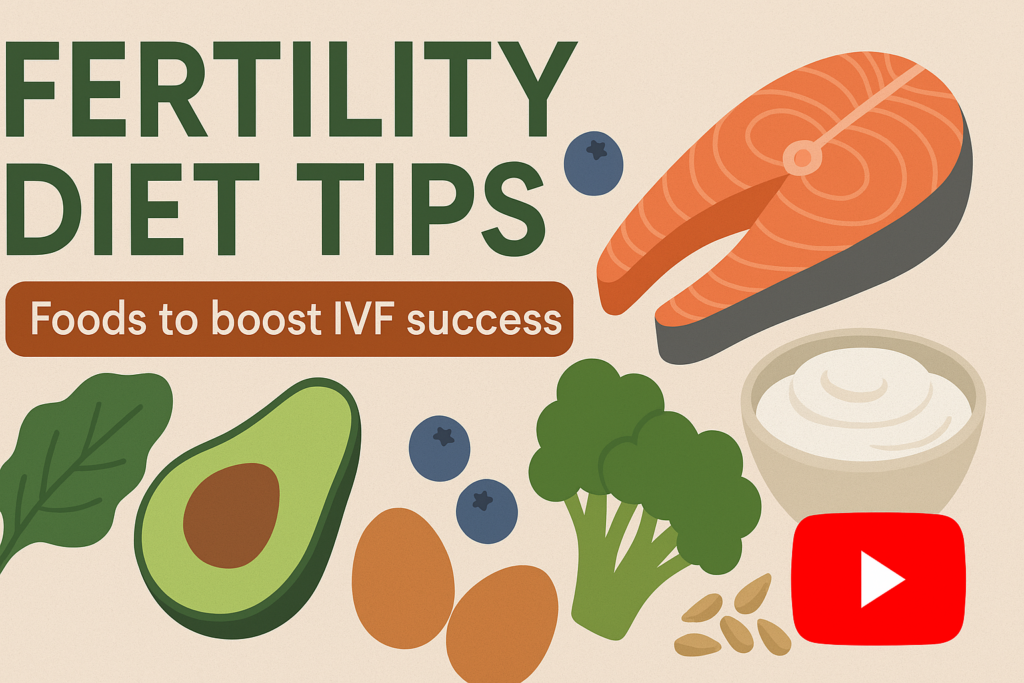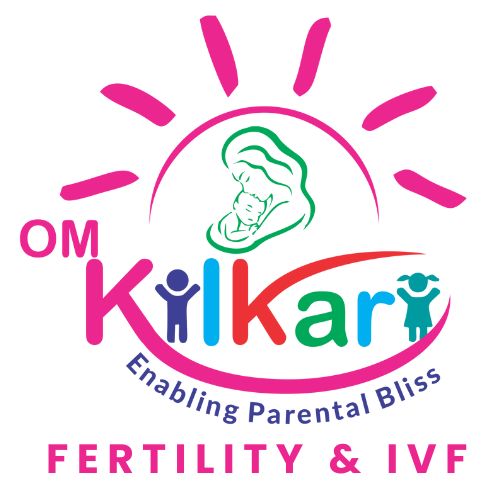
When undergoing in vitro fertilization (IVF), it’s natural to want to do everything possible to improve your chances of a successful outcome. One often overlooked factor is nutrition. What you eat before and during your IVF cycle can significantly influence fertility and implantation. While a healthy diet alone won’t guarantee success, it plays a crucial role in supporting your hormonal balance, egg quality, sperm health, and overall reproductive wellness.
In this blog, we’ll explore the best fertility diet tips and foods to enhance IVF success, backed by scientific evidence and expert recommendations.
Why Diet Matters During IVF
A balanced diet provides your body with essential nutrients that:
- Regulate hormones
- Improve egg and sperm quality
- Support embryo implantation
- Strengthen the immune system
- Maintain a healthy weight
- Reduce oxidative stress
Several studies have shown that dietary choices can directly impact fertility. For instance, the Mediterranean diet—rich in fruits, vegetables, whole grains, healthy fats, and lean proteins—has been associated with higher IVF success rates.
Key Nutrients for IVF and Fertility
Here are some essential nutrients you should include in your fertility-focused meal plan:
1. Folic Acid (Folate)
Folate is vital for DNA synthesis and cell division, especially during early pregnancy. It also helps prevent neural tube defects.
- Sources: Leafy greens, broccoli, avocados, legumes, citrus fruits, and fortified grains.
2. Iron
Iron supports ovulation and helps prevent anemia, which can impact fertility.
- Sources: Red meat (in moderation), lentils, spinach, tofu, and fortified cereals.
3. Omega-3 Fatty Acids
Omega-3s reduce inflammation and improve embryo implantation.
- Sources: Fatty fish (salmon, sardines), walnuts, chia seeds, and flaxseeds.
4. Antioxidants (Vitamins C & E, Selenium, Zinc)
Antioxidants help combat oxidative stress, which can damage egg and sperm cells.
- Sources: Berries, nuts, seeds, citrus fruits, spinach, and whole grains.
5. Protein
Adequate protein intake helps with hormone production and egg development.
- Sources: Eggs, poultry, fish, beans, lentils, and dairy products.
6. Vitamin D
Vitamin D deficiency is linked to lower IVF success rates.
- Sources: Sunlight, fortified dairy, eggs, mushrooms, and fatty fish.
Top Fertility-Boosting Foods
Here’s a list of foods to add to your fertility diet that can enhance your IVF journey:
1. Leafy Greens
Kale, spinach, and Swiss chard are packed with folate, iron, and calcium—key for reproductive health.
2. Avocados
Rich in healthy fats, folate, and vitamin K, avocados support hormonal function and uterine health.
3. Berries
Strawberries, blueberries, and raspberries are antioxidant-rich and combat oxidative stress.
4. Eggs
Eggs provide high-quality protein, vitamin D, and choline, which are essential for egg development.
5. Salmon
A great source of omega-3 fatty acids and vitamin D, salmon supports embryo implantation.
6. Nuts & Seeds
Almonds, walnuts, pumpkin seeds, and sunflower seeds are rich in zinc, vitamin E, and healthy fats.
7. Whole Grains
Brown rice, quinoa, oats, and whole wheat contain fiber and B vitamins that help regulate insulin levels.
8. Greek Yogurt
Greek yogurt provides probiotics and calcium that support a healthy reproductive system.
9. Lentils & Beans
Plant-based proteins and iron-rich lentils are excellent for fertility and hormonal balance.
10. Sweet Potatoes
Sweet potatoes are a great source of beta-carotene, which helps in hormone production and embryo development.
Foods to Avoid During IVF
Just as certain foods can enhance fertility, others can negatively impact your IVF success. Here’s what to limit or avoid:
1. Processed Foods
High in trans fats, sugars, and additives, processed foods can lead to inflammation and hormonal imbalance.
2. Caffeine
High caffeine intake may reduce fertility. Limit to 1 cup (about 200 mg) of coffee per day during IVF treatment.
3. Alcohol
Alcohol can interfere with hormone levels and reduce implantation rates. It’s best to avoid alcohol altogether during your IVF journey.
4. Raw or Undercooked Foods
Avoid raw fish, sushi, unpasteurized dairy, and undercooked meat to reduce the risk of foodborne illness.
5. Sugary Beverages
Soft drinks and sugary juices can spike insulin levels and promote inflammation.
6. Soy-Based Processed Foods
Excessive soy intake, particularly in processed form, may mimic estrogen and disrupt hormonal balance.
Hydration Matters
Staying hydrated is essential for reproductive health. Water helps with:
- Nutrient transport
- Detoxification
- Cervical mucus production
- Hormone regulation
Aim for at least 8-10 glasses of water per day. For a refreshing fertility boost, add water infused with lemon, mint, or cucumber.
Meal Plan Example for IVF Diet
Here’s a sample fertility meal plan to give you an idea of how to incorporate these foods:
Day 1
Breakfast:
- Greek yoghurt with chia seeds, mixed berries, and a drizzle of honey
- Herbal tea or a glass of warm lemon water
Snack:
- Handful of walnuts and almonds
Lunch:
- Quinoa salad with avocado, chickpeas, spinach, and olive oil dressing
- Whole grain toast
Snack:
- Sliced carrots and hummus
Dinner:
- Grilled salmon with steamed broccoli and sweet potatoes
- Mixed green salad
Lifestyle Tips to Complement Your Fertility Diet
In addition to diet, consider these lifestyle habits to support IVF success:
1. Maintain a Healthy Weight
Being underweight or overweight can negatively affect hormone levels and ovulation.
2. Exercise Moderately
Engage in light to moderate activities like yoga, walking, or swimming to support circulation and reduce stress.
3. Manage Stress
Practice mindfulness, meditation, or journaling to reduce cortisol levels, which can impact fertility.
4. Sleep Well
Aim for 7-8 hours of quality sleep each night to support hormonal function.
5. Quit Smoking
Tobacco use is linked to lower fertility rates and poor egg/sperm quality.
Partner’s Role in the IVF Diet
Male fertility also plays a significant role in IVF success. Men should also follow a fertility-supportive diet rich in:
- Zinc (pumpkin seeds, oysters)
- Selenium (Brazil nuts, tuna)
- Antioxidants (berries, citrus fruits)
- Vitamin C & E (citrus, nuts, leafy greens)
Avoid smoking, excessive alcohol, and heat exposure (like saunas or hot tubs) which can reduce sperm count and motility.
Supplements and IVF
While a healthy diet is key, your doctor may recommend supplements like:
- Prenatal vitamins
- Coenzyme Q10 (CoQ10) for egg quality
- Vitamin D
- Myo-inositol (especially for women with PCOS)
- Omega-3 supplements
Always consult your fertility specialist before starting any supplements.
Conclusion
Your diet is a powerful tool on your IVF journey. By focusing on nutrient-rich, whole foods and avoiding inflammatory or processed items, you can create the optimal environment for conception and implantation. Remember, no magic food guarantees IVF success, but nourishing your body sets the stage for the best possible outcome.
If you’re considering IVF or already undergoing treatment, consult with a fertility nutritionist to create a personalized diet plan tailored to your specific needs.
